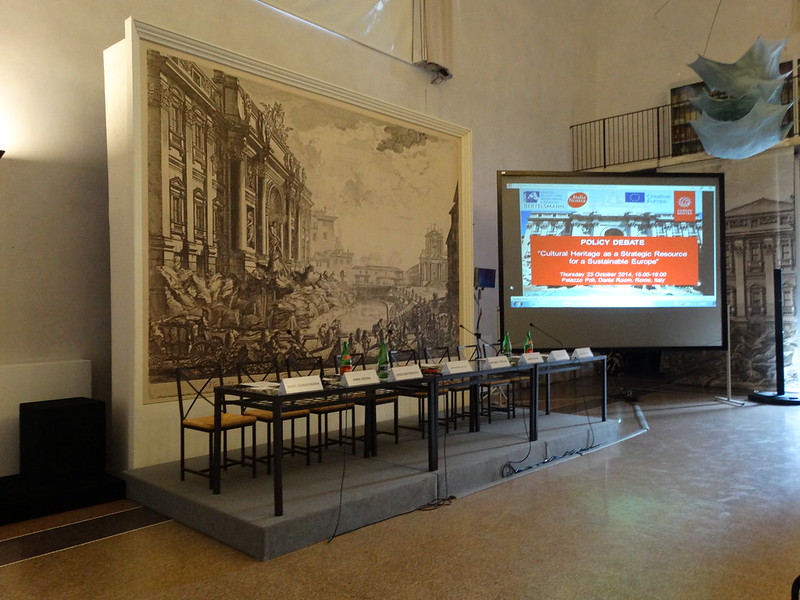European leadership must adopt concrete measures for the sustainable development of Europe’s cultural heritage
The panel discussion on ‘Cultural heritage as a strategic resource for a sustainable Europe” took place in the afternoon of 23 October 2014 at the Palazzo Poli in Rome. This event was organised by the leading European heritage organisation Europa Nostra in cooperation with the Italian Ministry of Cultural Heritage, Cultural Activities and Tourism, during the Italian Presidency of the European Union.

The debate compared the experiences of public officials and private Italian and European stakeholders on the ways in which entrepreneurs and the private finance sector could be engaged, in line with the Conclusions adopted by the EU Council last May and the Communication adopted by the European Commission last July.
“It is certain that our cultural heritage and the ways through which we preserve it and valorise are important to bring investment for social capital and the centrality of culture. It must therefore become a fundamental aim of European and member states’ policies.” This statement was made by the Secretary General of Europa Nostra, Sneška Quaedvlieg-Mihailović, at the opening of the panel discussion. “European leadership must adopt concrete measures for the sustainable development of Europe’s cultural heritage and identify efficient governance and management based on culture, respecting and increasing social, cultural, symbolic and economic value of cultural heritage,” advocated Sneška Quaedvlieg-Mihailović, who moderated the debate.
Maria Antonella Fusco, Director of the National Institute for the Graphic Design, highlighted the importance of a network strategy between European cultural institutions that have similar values concerning history and identity.
Lucio Battistotti, Head of the European Commission Representation in Italy, emphasised the importance of cultural tourism. “Tourism is estimated to contribute €415 billion to the EU GDP and 3.4 million tourism enterprises account for 15.2 million jobs – many linked to heritage, directly or indirectly. This is a further incentive to give a cultural dimension to European Union funding.”
Antonia Pasqua Recchia, Secretary General of the Ministry of Cultural Heritage, Cultural Activities and Tourism (MiBACT), stressed Italy’s fundamental contribution to put on the agenda policies on cultural heritage at European and national level. “It was in fact thanks to MiBACT that the word ‘Culture’ appeared in the national document of implementations of ‘Europe 2020’ strategies. “In Italy, a close synergy between the ministries of Culture and Tourism was activated to improve the use of our cultural heritage to generate integrated touristic offers and leisure activities around cultural heritage. For instance museums will have a central strategic position when activating intelligent policies on ticketing when collaborating with the Ministry of Education.”
Marco Parini, President of Italia Nostra, stressed the importance of an integrated approach between public and private partners in the management, conservation and use of communal cultural heritage. “Care of cultural heritage is one of the state’s duties but its valorisation and management are aspects in which citizens must and can be involved in a relationship between public and private. In other countries, such as the UK, this collaboration works well. This sharing experience could become a system of conservation and use of our cultural heritage that is in line with modern times and the needs of the audience in terms of services.”
Francesco Bandarin, former UNESCO’s Assistant Director-General for Culture and Professor of Urban Planning at the University of Venice (IUAV), placed the policy developments in Europe into the worldwide context, referring to UNESCO’s World Forums on Culture and Culture Industries held in Hangzhou, China, in May 2013, and in Florence, Italy, in October 2014, and namesake Declarations adopted on these occasions, which advocate the integration of culture in the post-2015 development agenda. Bandarin also spoke about Venice and called for the implementation of a sustainable environmental and tourism development plan for this heritage gem.
Luca Bergamo, Secretary General of Culture Action Europe, stressed the importance of the heritage and arts sectors to join forces to raise the profile of culture in Europe, to strengthen the lobby for culture addressing the new European Commission and new European Parliament.
Anna Zegna, President of the Fondazione Zegna and Council Member of Europa Nostra, set the project ‘Oasi Zegna’, developed in close collaboration with the local community, as an example of a holistic approach to cultural heritage.
Marc Sundermann, Manager Government Relations of Bertelsmann, emphasized the engagement of the company in preserving cultural heritage, mentioning two specific projects in film and opera archives (‘archivio Ricordi’) restoration.
The second session, moderated by Rossana Bettinelli, shed light on the best heritage initiatives from Italy in 2014, which received an EU Prize for Cultural Heritage / Europa Nostra Award, considered Europe’s most prestigious prize in this field. Five exemplary achievements were honoured this year: the conservation of the Basilica Palladiana in Vicenza, the Teatro Sociale in Bergamo and the Walser Houses in Alagna Valsesia; the research project on the Roman Vaulted Construction in the Peloponnese, Greece; and the Iubilantes Association in Como for its dedicated service to heritage. In all cases there was a positive impact on the local area, with both private and public funding involved in the restaurations.
This panel discussion was organised in the framework of the network project ‘Mainstreaming Heritage’, which has the support of the Creative Europe programme of the European Union.






